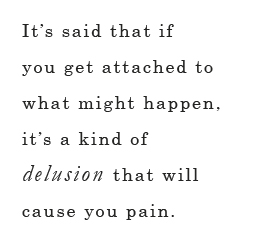For the past three weeks I’ve been under cover embedded at a Zen Buddhist Center trying to get the real story on “mindfulness,” which seems all the rage these days especially now that Superbowl champs, the Seattle Seahawks, are adopting some form of this practice.
What I’m learning is simplicity. That’s the Zen thing–or so they say.
Here’s my first discovery. In non-Zen environments, every time I do a task I know why I’m doing it. If I’m sweeping the floor it’s because it’s dirty. If someone asks me to do something they tell me why. I cannot think of a time this was not true, until now. This Zen Center, which is part school, part retreat center and part monastery, tells me nothing. It is entirely paradoxical that it talks of compassion, while breaking me down.
Under its spa resort look of cleanliness, stucco and charming fireplaces, lies a story of deep delusion and control, which even the sweet scent of incense can’t hide. The delusion that after a short time in residence I would have a room of my own and work in my field of writing, editing and story telling died and got tossed on the bone pile of the thousands before me with delusions of their own. In Zen practice no one gets to be special. I am in a dorm room which acts partly as a hallway for the room next door and not one person here knows or cares what my skills are. For a while I tried to tell someone I could contribute more than brute labor, to which I received no response except a request to take a big bucket of rotting food out to the compost pile.
Nothing is my own here. My walking is watched, and how and when I bow is corrected; if I continue using paper napkins instead of the cloth ones, it could be a deal breaker, and so could forgetting to turn the water off between soaping and rinsing my hands. The way the Zendo is entered, even how I hold my hands–every detail is cause for correction. Zen practice appears to have no sense of humor until you meet those who run the place and have been at it for years, they are as fluid as a stream and entirely unconcerned. The paradox emerges again. But until I reach that Zen master status, which I’m telling you now is a chance of less than point one percent, I’m in meditation before sunrise and still at it long after the sun has had enough for the day.
 Recently I had the experience of one of Buddhism’s big ideas beyond the whole suffering thing (the first Noble Truth, which I’m certainly getting the hang of) and that’s detachment. It’s said that if you get attached to what might happen, it’s a kind of delusion that will cause you pain. What may happen can’t be known so they say don’t worry about it, just do what’s right and it’ll work out how it should. Detachment is Buddhism’s fancy way of saying “don’t count your chickens before they’re hatched” and certainly don’t make big plans for those chickens and think how special it’ll be when they come along. If they hatch, you can enjoy them, love them if you want to because they are now reality. That’s not the whole complicated thing but that’s a big part of it.
Recently I had the experience of one of Buddhism’s big ideas beyond the whole suffering thing (the first Noble Truth, which I’m certainly getting the hang of) and that’s detachment. It’s said that if you get attached to what might happen, it’s a kind of delusion that will cause you pain. What may happen can’t be known so they say don’t worry about it, just do what’s right and it’ll work out how it should. Detachment is Buddhism’s fancy way of saying “don’t count your chickens before they’re hatched” and certainly don’t make big plans for those chickens and think how special it’ll be when they come along. If they hatch, you can enjoy them, love them if you want to because they are now reality. That’s not the whole complicated thing but that’s a big part of it.
So here’s how attachment bit a hole in my fatigued little heart. I stood in the Center’s kitchen with fifteen-foot ceilings sheltering huge windows where the white light burned into the acid-washed concrete floors. For days I had been left to meditate in my own silence on the floor, hour after hour, often facing a wall without moving. Two dozen others were in there with me and we all had some good suffering going on. When I wasn’t doing that I was in this kitchen, the maid for the cooks, attending to sink after sink of dirty dishes and chopping onions or squeezing lemons. I was not to speak, which they call “noble silence,” and to do as told. I received no explanation of why I did what I did. On this day the assignment was to cut twenty-seven very large carrots into very small triangular pieces. I was given a short lesson and a piece of carrot which would be the right size and shape to copy. For more than an hour I chopped and sweated to create the perfect carrot triangles. The carrots were hard: they shifted on the cutting board and my hands ached under the pressure.
The physical reality of pushing that hard for that long took its toll on my red and swollen palms. But I finally finished and put the neatly chopped pieces in a shiny silver bowl. I bowed my head and presented the bowl to the cook. I hoped she might say I did a good job. Wordlessly she took the bowl and turned her back on me. She walked to the other side of the kitchen and without pause she tossed the twenty seven carrots cut into perfect, tiny triangles in a food processor and ground them to mush. All that effort for nothing. My face burned red. I felt tricked and senselessly wounded.
I thought of every job I had ever had, every book I read and thought would give me better insight, every time I hoped someone would love me; these all went into that food processor with the carrots. Whirrrr, zshhhh, click. That’s every anticipation of every hope now reduced to an orange mush. That’s every A on my report card or a killer red dress or a sentence I slept with to get right.
Anticipating good things will happen is not the same thing as them actually happening. It takes wisdom to know the difference and to be okay however it goes. The A is still good, the dress is nice and the book was enjoyed. That’s got to be good enough.
Attachment ends in disappointment. The delusion that the effort of the carrots or anything that I think will make me special are just my stories. My hands and back hurt because I believed that delusion and put in way more effort than I needed to. Bam. That’s Zen school, lesson one taught every day.
Tomorrow I will be in the kitchen for hours. I will no doubt be chopping and slicing, washing dishes and standing on my tired legs. But tomorrow I will notice the feel of warm water, the good smell of soap and how all that light bounces around as I chop the carrots with a perfectly balanced knife as I work with something as real as vegetables. I won’t give a damn what happens to them when I’m done enjoying my work…or will I?
That’s lesson two.
Also by Julie: Old Things, New Lives
More personal essays: My Real Mother was a Cat – A Story of Love
__
Photo: rcoder via Flickr

